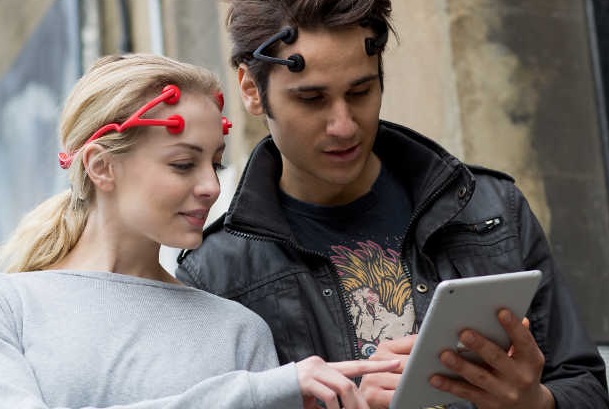Why the Interest in tDCS?
Research studies and anecdotal evidence show that tDCS, a simple and safe way to stimulate the brain, does have the ability to enhance memory, speed learning, improve physical skill, and enhance creativity. There are now well over 1,000 published studies of tDCS with more underway and research participation of institutions ranging from Harvard Medical, MIT, Emory University, to the University of Alabama and dozens more.

(tDCS headset. http://www.foc.us)
Already, high-school and college students are catching on to just what tDCS may do for them. There are many YouTube and blog posts from and by students discussing their experience with tDCS and others asking for help in setting up and using a tDCS device. Some indicate substantial improvement in their performance with tDCS. As tDCS devices become more accessible and word of it continues to spread through popular press and internet resources (NYT, Nature, Scientific American and many others have already published tDCS articles), educators can eventually expect to be confronted with some significant ethical and policy questions.
While it’s difficult to pin-down an exact percentage improvement students see in their work, (more studies are required), students use words like “significant”, “substantial”, and “surprising” in their comments. As time goes on, not only will more students demand access to tDCS, it is likely that parents, seeking greater success for their children, will encourage its use.
How Might tDCS Be Used by Students
- During study for tests – including high-stakes (SAT, etc.)
- Learning lists of material (names, dates, places, events, etc.)
- Learning new languages (spoken and written)
- Improving athletic skill
- Enhancing creativity in writing, art, film production, etc.
- To reduce or eliminate depression (a common problem in student populations)
Ethical Issues
Educators must face the reality that certain students will “brain boost” using tDCS and by doing so, improve their classroom performance as well as on assorted tests that are common in education settings. Even “high-stakes” test outcome could be positively influenced for students making proper use of tDCS. Student athletes may use tDCS to improve their performance on the tennis court or football field.
- If a student using tDCS for study can perform 10% better on an SAT test than an equally talented student who does not possess a tDCS device, is there a fairness or ethical issue?
- If a student has a learning disability and through the use of tDCS is able to perform at “non-disability” levels, is there a fairness or ethical issue?
- Will we now enter a new era of “haves and have not’s” in K-12 and higher-education learning?
- Will students from middle-class and above families, able to afford a device and related training, take advantage of it while lower income, less advantaged students will go without?
If tDCS, well used, can improve test scores, is that not ultimately going to be very significant in the lives of some students?

(George Mason University)
Policy Questions
If tDCS is going to play some role in the lives of K-12 and higher ed students in the coming years, then perhaps it’s time to begin creating policy to address tDCS – including:
- Will tDCS use be permitted (even though it will be impossible to regulate home use)?
- Will students be trained in proper tDCS use in school? (or after school)
- Will schools provide tDCS devices for students when the family cannot afford it?
- Will schools encourage tDCS as a means to improve test scores?
- Will school clinics offer tDCS treatments for those suffering with depression (rather than medicate them?)
- Will legal liability issues limit the ability of schools to responsibly encourage and direct the use of tDCS in education settings?
tDCS is a wonderful thing! It has the potential to help the human condition on so many levels – from depression to Parkinson’s disease, with learning enhancements thrown in as a bonus. How will we, as educators, respond to this fascinating new capability – which students have already discovered?
Let the dialog begin!
Contact me via brent@speakwisdom.com
For more information on tDCS see www.speakwisdom.com, http://www.diytdcs.com, http://www.transcranialbrainstimulation.com, http://www.pubmed.gov, and Google!
I’d say that the ethic issues aren’t actually an issue. What’s the difference in using a tDCS for a brain boost, with regards to test studying, Or someone listening to disorienting music to study in a busy area vs someone playing classical music (which we know boosts cognitive functioning) in a quiet area, or someone supplementing Nootropics on a healthy nutrition plan vs vs someone eating really trashy foods which don’t benefit their cognitive functioning?
It all comes down to a matter of choice. If someone wants to pay a bit extra and get a tDCS for studying / college / programming / etc.. why not? Who knows, that extra stimulation might push them into ‘breakthrough’ mode, and something important might get created, or a major problem might be solved.
I see it as only a good thing. More power to cognitive choices!
I think augmentation only poses an ethical issue when it is detrimental to health. Actually, we might be too preoccupied with all the XX. century egalitarian bull*.
SAT scores are not a sport, ie. not a controlled game played for the fun of it to see who’s the most clever person on Earth. It’s real life, and in real life anything goes.